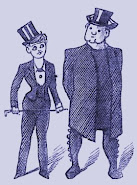“Vanity
Fair, another sixteen page quarto
was commenced December 31, 1859. Louis H. Stephens was the publisher, and Frank
Wood, the burlesque writer and dramatic critic was the editor. The cartoons
were drawn by Henry L. Stephens, a brother of the publisher, assisted by
Bellew, E. F. Mullen, McClenan, Sol Eytinge and others. The corps of writers
embraced among others Fitz James O’Brien, William Winter, dramatic critic of
the Tribune, Henry Clapp,
Jr., (“Figaro”) Richard Henry Stoddard, George Arnold, Edmund Clarence Stedman,
Fitz Hugh Ludlow, Charles Dawson Shanley, C. F. Browne, (“Artemus Ward”) and
Thomas Bailey Aldrich. After a little over a year, Charles Godfrey Leland
became the editor and was succeeded in a brief time by “Artemus Ward,” who
left, after contributing some of his best sketches, on a lecturing tour.
Charles Dawson Shanley then assumed editorial control, and continued until the
periodical expired on the fourth day of July, 1863, aged about three and one
half years.” -- Comic Periodicals of America HERE
Henry L. Stephens, the principal cartoonist on Vanity Fair, was born in Philadelphia 11
Feb 1824 and died at Bayonne, New Jersey 13 Dec 1882. His first venture into
comic art was illustrating a small pamphlet entitled Billy Vidkins. He studied at the Philadelphia Academy of Fine Arts
and was engaged as an artist by Frank Leslie in 1859 followed by a stint at Harper’s Weekly. In 1863 he began a series
of chromolithographs and drew cartoons for Mrs.
Grundy in 1868 and for Punchinello
in 1870. He was an accomplished watercolorist and illustrated The Comic Natural History of the Human Race,
six volumes of Nursery Rhymes for
Julius Bien, Mother Goose Melodies,
published by Hurd & Houghton, and Aesop’s
Fables. In 1860 R. M. De Witt of Frankfort Street published The Goblin Snob: an Extra Extravaganza and
Funny Phantasy imagined and perpetuated in nearly fifty plates by Henry L.
Stephens. Vanity Fair was
published from 100 Nassau Street, jokingly known in the trade as “the Swamp.” Several volumes are available for perusal HERE


























No comments:
Post a Comment